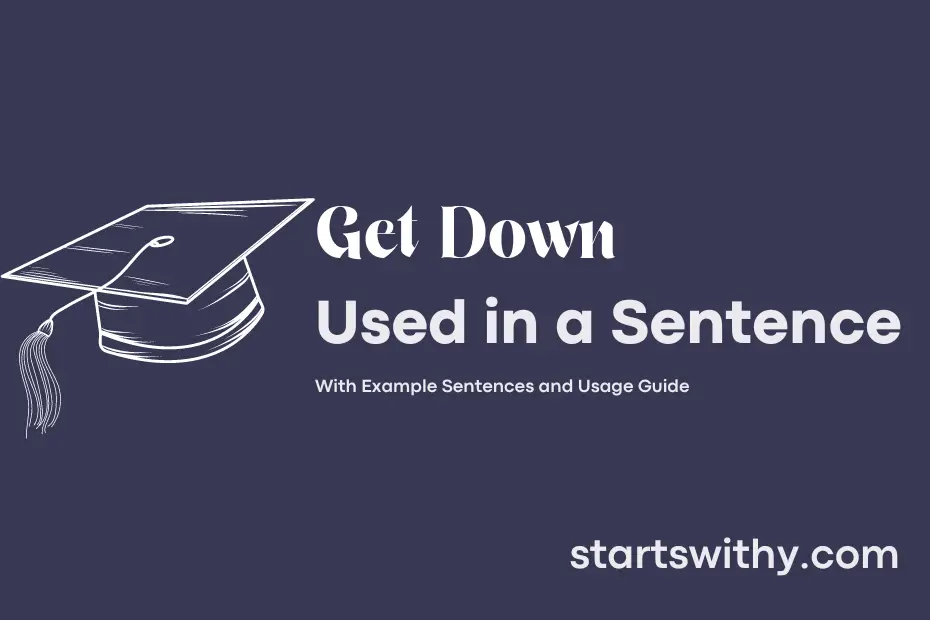Have you ever heard someone tell you to “get down” and wondered what it meant? In English, the phrase “get down” is commonly used to mean lowering oneself physically or emotionally, or to start dancing with enthusiasm.
When someone tells you to “get down,” it can be an invitation to join in on the fun and let loose. This versatile phrase can be used in various contexts, from getting down on the dance floor to getting down to work on a project. Let’s explore more ways this expression can be used in everyday conversations.
7 Examples Of Get Down Used In a Sentence For Kids
- Please get down from the chair.
- Let’s all get down on the floor for some stretching.
- It’s time to get down and dance to the music.
- Remember to get down carefully from the bus.
- Can you help me get down this box from the shelf?
- The monkey loves to get down from the tree and swing around.
- After playing, it’s important to get down and rest.
14 Sentences with Get Down Examples
- Get down from the bunk bed carefully.
- Make sure to get down at the right bus stop.
- We need to get down to business and start studying for the exams.
- Let’s get down to the canteen before it gets too crowded.
- Don’t forget to get down your notes from the last lecture.
- It’s important to get down all the assignment deadlines in your planner.
- Get down your dance moves for the upcoming college fest.
- Remember to get down the important points during the lecture.
- Let’s get down to the library and borrow some reference books.
- Make sure to get down the bus timings for your daily commute.
- Don’t be afraid to get down your thoughts in your journal.
- Get down your research findings in a systematic manner for your project.
- Are you ready to get down to exploring new interests and opportunities?
- It’s time to get down to organizing a study group session for better exam preparation.
How To Use Get Down in Sentences?
To use Get Down in a sentence, start by identifying a situation where you want to express the idea of getting down or partying. This phrase is often used in social settings to encourage people to have fun and enjoy themselves.
For example, you could say, “Let’s get down on the dance floor tonight!” This implies that you want to have a great time dancing and letting loose with friends.
Another way to use Get Down is in a more casual context, where you simply want to convey the idea of having a good time. You could say, “I’m ready to get down this weekend and relax after a long week of work.”
When using Get Down, remember that it is a colloquial expression that is often used in informal or upbeat conversations. It is not typically used in formal or professional settings.
Overall, the key to effectively using Get Down is to understand the context and tone of the conversation. By using this phrase in appropriate situations, you can convey a sense of excitement and enthusiasm for having a good time with others.
Conclusion
In conclusion, using sentences with the keyword “get down” can help convey actions related to lowering oneself physically or emotionally, such as dancing energetically, understanding a difficult concept, or feeling sad or dejected. These sentences serve as vivid descriptions that can paint a clear picture for the reader about what is happening in a particular situation. By incorporating this versatile phrase into writing, one can enhance the narrative by providing specific details about the actions, emotions, or attitudes of the characters or events being described.
Furthermore, employing sentences with “get down” can bring a dynamic and engaging element to storytelling, allowing for a more immersive experience for the audience. Whether used in fiction, non-fiction, or everyday communication, these sentences add depth and flavor to the content, making it more descriptive and engaging for the reader or listener.



